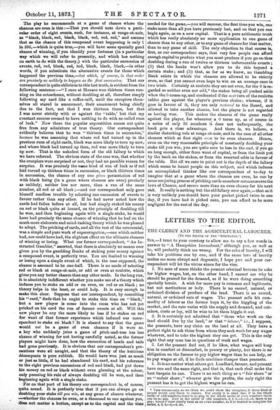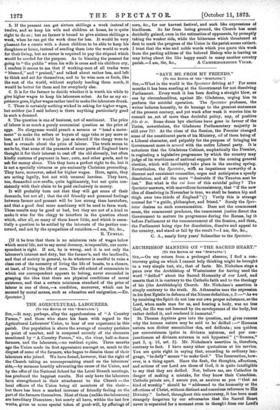LETTERS TO THE EDITOR.
THE CLERGY AND THE AGRICULTURAL LABOURER.
[TO THE EDITOR OF THE "SPECTATOR."' SIR, —I trust to your courtesy to allow me to say a few words in answer to "A Hampshire Incumbent," although you, as well as he, will probably think mo wrong. For the sake of brevity, I will take his positions one by one, and if the same love of brevity makes me seem abrupt and dogmatic, I hope you and your cor- respondent will let the virtue atone for the vice.
1. No man of sense thinks the peasant criminal because he asks for higher wages, but, on the other hand, I cannot see why he should be praised for the demand, as if he were doing something specially heroic. A wish for more pay is common and legitimate, but not meritorious or holy. There is no sacred, natural, or ordained division of produce of the land. There is no sacred, natural, or ordained rate of wages. The peasant sells his com- modity of labour as the farmer buys it, by the higgling of the market, and the rate varies with the supply and demand, and out- siders, cleric or lay, will be wise to let them Niggle it out.
2. It is certainly not admitted that " those who work on the land should live by the land," or that " labour," i.e., I suppose, the peasants, have any claim on the land at all. They have a perfect right to ask those from whom they seek work for any wages whatever, and to take the highest they can get. This is the only right that any man has in questions of work and wages.
3. Let the peasant find out, if he likes, what wages will keep him in comfort or discomfort, in penury or plenty, but there is no obligation on the farmer to pay higher wages than he can help, or to pay wages at all, if he finds machines cheaper than peasants.
4. It is no matter what others get. Landlord, farmer, and peasant have one and the same right, and that is, that each shall make the best bargain he can. There is no such thing as a " fair share " or an " unfair share ;" whoever gets the profits, the only right the peasant has is to get the highest wages he can.
• Very erroneously, as we think we could show the croupiers, if those kind of people would only listen to reason. For surely it is clear that, it in the whole series of odd numbers there is no gsp, in the whole series of even numbers there can be no gap. Now in the series of odd numbers, 5, 3, 1,-1,-3,-5, there is no gap; hence 0 must clearly rank as an even number, as it Is wanted to complete the series, 4, 2, 0,-2,--i, &e. 5. If the peasant can get sixteen shillings a week instead of twelve, and so keep his wife and children at home, he is quite right to do so ; but no farmer is bound to give sixteen shillings a week, when he can get the work done for less. It would be very pleasant for a curate with a dozen children to be able to keep his daughters at home, instead of sending them into the world to work for their living, but no rector is required to pay the stipend which would be needed for the purpose. As to blaming the peasant for going to " the public " when his wife is cross and his children cry, I confess it seems to me that if working-men of all trades were " blamed," and "praised," and talked about rather less, and left to think and act for themselves, and to be wise men or fools, like the rest of the world, without anybody heeding them much, it would be better for them and for everybody else.
6. It is for the farmer to decide whether it is worth his while to give higher wages to keep his labourers sober. As far as my ex- perience goes, higher wages rather tend to make the labourers drunk.
7. There is certainly nothing wicked in asking for higher wages, but neither (as I said before) is there anything particularly good in such a demand.
8. The question is one of business, not of sentiment. The price of labour is as much a purely economical question as the price of eggs. No clergyman would preach a sermon or "head a move- ment" to make the sellers or buyers of eggs take or pay more or less, and I think it would be just as absurd if the clergy were to head a crusade about the price of labour. The truth seems to me to be, that some of the peasants of some parts of England have thought it for their interest to cast off the old slovenly, but often kindly customs of payment in beer, corn, and other goods, and to ask for money alone. This they have a perfect right to do, but it is not a specially virtuous or pre-eminently Christian proceeding. They have, moreover, asked for higher wages. Here, again, they are acting legally, but not with unusual heroism. They have, too, demanded cow-crofts, quite legitimately, but not quite con- sistently with their claim to be paid exclusively in money.
It will probably turn out that they will get some of their demands, but not all ; that the old friendly and personal feelings between farmer and peasant will be less strong than heretofore, and that a good deal more machinery will be used in farm work. These results may be good or bad, but they are not of a kind to make it wise for the clergy to interfere in the question about which, after all, so many of them know little, and which is essen- tially a question to be settled by the interests of the parties con- cerned, and not by the sympathies of outsiders.—I am, Sir, &c.,
R. TEMPLE.
[If it be true that there is no minimum rate of wages below which moral life, not to say moral decency, is impossible, our corre- spondent is right. If not, he is wrong, and it is not only the labourer's interest and duty, but the farmer's, and the landlord's, and that of society in general, to do whatever is needful to raise a class out of the necessity of living the life of beasts, to a chance, at least, of living the life of men. The old school of economists to which our correspondent appears to belong, never succeeded in grasping the idea that there are physical conditions of moral existence, and that a certain minimum standard of the price of labour is one of them,—a condition, moreover, which can be secured by moral means, such as education and emigration.—ED. Spectator.]



































 Previous page
Previous page